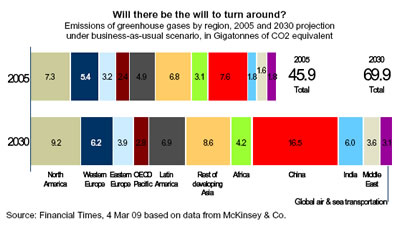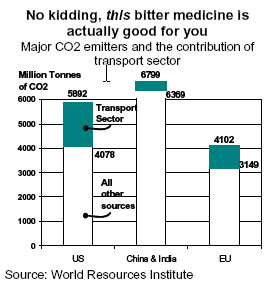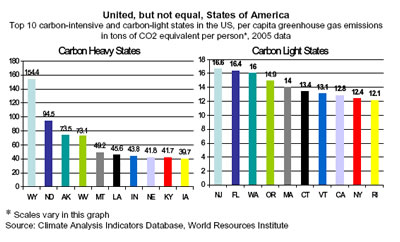Will Obama’s Climate Plan Be Too Taxing On Sputtering Economy?
From the April 2009 issue of EEnergy Informer.
Opponents of proposed cap-and-trade scheme say it is ill-timed and will be costly
The biggest challenge facing any politician pushing for legislation on climate change is to convince skeptical voters that the bitter medicine is in fact good for them, and they should embrace it. No matter how it is enacted and what it is called, the net effect is likely to be increased costs of fossil fuels, especially carbon-heavy coal for power generation and petrol in the transportation sector.

Moreover, the impacts are likely to be felt more or less immediately while the benefits will accrue over time – in this case by avoiding even more painful costs due to the unknown effects of climate change. Add the current global economic crisis and dramatic loss of jobs and you can see that climate change is not a popular idea among many politicians or voters.
It is against this stark background that President Obama and some of his supporters are trying to push climate change legislation in the US Congress while leading international efforts to do the same – a role abdicated by the Bush Administration. They face strong head wind from industry.
In a major policy speech at the end of January, Mr. Obama delighted the international environmental community when he declared, “the days of Washington dragging its heels on global warming are over,†adding, “America is ready to lead.†He said, “I’ve made it clear that we will act, but so too must the world.†Secretary of State Hillary Clinton reiterated that the “time for realism and action is now,†but warning that “no solution is feasible without all major emitting nations†– a polite reference to China, India and other developing countries.
Mr. Obama has selected Todd Stern as his lead envoy on climate change, responsible for participating in negotiations in Copenhagen in December for a replacement to highly symbolic Kyoto Protocols, which expire in 2012.

As envisioned by the Obama team, the climate plan would go into effect in 2012 – hopefully after the US economy has emerged from its current recession – and would provide compensating tax breaks targeted at lower income households who spend a large percentage of their income on energy. In contrast to the proposals by US Climate Action Partnership, the Obama plan would auction all or nearly all emissions, raising an estimated $646 billion between 2012-2019, a number some experts say is conservative. The aim is to reduce US emissions of GHGs roughly 80% from their 2005 levels by 2050 – as many scientists have recommended.

In testimony before Congress, the Treasury Secretary Timothy Geithner confessed, “There is no way to try to get us on a path to energy independence and address the critical problems caused by climate change without changing the incentives.†Referring to the necessity of higher energy prices Peter Orszag, Obama’s Budget Director, told Congress, “Those price increases are essential to the success of a cap-and-trade program.â€
As various interest groups try to determine what this will mean to them individually and as members of a given sector or region, many have come to see the plan as costly and ill-timed. Coal-burning electric utilities, in particular, complain that this would turn them into unwilling tax collectors for the federal government.

It is also not entirely clear how the uneven collection and distribution of the carbon fees will take place. There is likely to be significant income transfers among states and regions (see graph above). Citizens of states like Wyoming, West Virginia and Kentucky that depend on coal-fired power generation for as much as 96% of their electricity, for example, are likely to be penalized while those in greener and cleaner states like California are likely to receive subsidies. Nuclear and hydro-dominated utilities will be largely unaffected – or gain from the scheme, relatively speaking – while coal-dependent utilities will suffer.
As Dallas Burtraw, an economist at Resources for the Future (RFF) observed, “This is going to change the distribution of wealth potentially for a century.†On the surface, it does not appear to be fair. But how else can we get coal-burning utilities to invest in carbon capture and storage technology or switch to cleaner fuels? How else do we encourage people to buy smaller cars and not drive as many miles as they currently do?
As reported in this newsletter Bending To Pressure, EU Waters Down It Cap And Trade Scheme (Jan 09), European leaders bowed to intense pressure from the industry in December 2008 at their summit in Brussels. There is no reason to expect that the US politicians will have an easier time trying the same in 2009.
One Response to 'Will Obama’s Climate Plan Be Too Taxing On Sputtering Economy?'
Leave a Reply
You must be logged in to post a comment.

on April 8th, 2009 at 10:46 am
[…] Will Obama’s Climate Plan Be Too Taxing On Sputtering Economy? […]